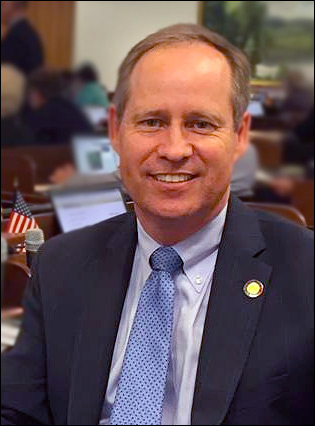By Jim Ellis

North Carolina state Rep. Greg Murphy (R-Greenville)
The run-off campaign was particularly low key. Neither candidate raised nor spent a huge amount money throughout the entire nomination process. Rep. Murphy will have expended approximately $600,000, while Dr. Perry only reached the $400,000 mark. Both, however, saw independent expenditures conducted on their behalf.
Originally, it appeared the conservative groups would be lining up behind Dr. Perry, and particularly pro-life groups, but when House Freedom Caucus chairman Mark Meadows (R-Skyland/Asheville) publicly endorsed Rep. Murphy the ideological lines appeared to break down.
Murphy carried 12 of the district’s 17 counties, and scored big in his home county of Pitt, with an 82-18 percent victory margin that accounted for more than half of his district-wide 6,972 vote win from a low turnout of 35,916 Republican run-off ballot casters.
Dr. Perry rebounded in her own home county of Lenoir, registering 75 percent of the vote there and cutting Murphy’s district vote margin by 1,482 votes. Though Murphy won 70 percent of the district’s counties, several were by very close margins: 4, 26, 61, 93, 127, and 227 votes.
Now, we move to the Sept. 10 special general election. Back in the April 30 primary, former Greenville Mayor Allen Thomas won the Democratic primary outright and automatically advanced into the general election. Now he and Rep. Murphy will battle for the seat in a campaign that should favor the new Republican nominee.
President Trump carried the 3rd CD with a 60-37 percent margin. Four years earlier, Mitt Romney defeated President Obama here, 58-41 percent, and in 2008 John McCain topped then-Sen. Obama, 57-42 percent. Rep. Jones first won the eastern North Carolina district in 1994 with an upset win over four-term Democratic incumbent Martin Lancaster. He averaged 71 percent of the vote in his 12 re-election campaigns.
The 3rd District occupies most of the eastern North Carolina coast, beginning at the Virginia/North Carolina border and traveling south to North Topsail Beach and through the Outer Banks. Its largest population centers are part of the city of Greenville, in addition to the municipalities of Jacksonville, New Bern, Nags Head, and Morehead City.
Rep. Murphy should be able to unite the Republican/right-of-center base, which will likely be enough for him to claim victory so long as the coalition turnout is adequate. To make the political climate more difficult for the Democratic nominee, Thomas will likely be dogged by a state Auditor’s negative management report about a non-profit organization that the former mayor now runs, a revelation made public just before the late April primary.
Also, on Sept. 10, voters in the Charlotte/Fayetteville area will go to the polls to finally select a congressman. This seat has been vacant since the 2018 election because voter fraud accusations kept the election results from being certified. The campaign features Democratic businessman Dan McCready, the 2018 nominee, and state Sen. Dan Bishop (R-Charlotte) in a race that looks to be more competitive than the 3rd CD special general election.
